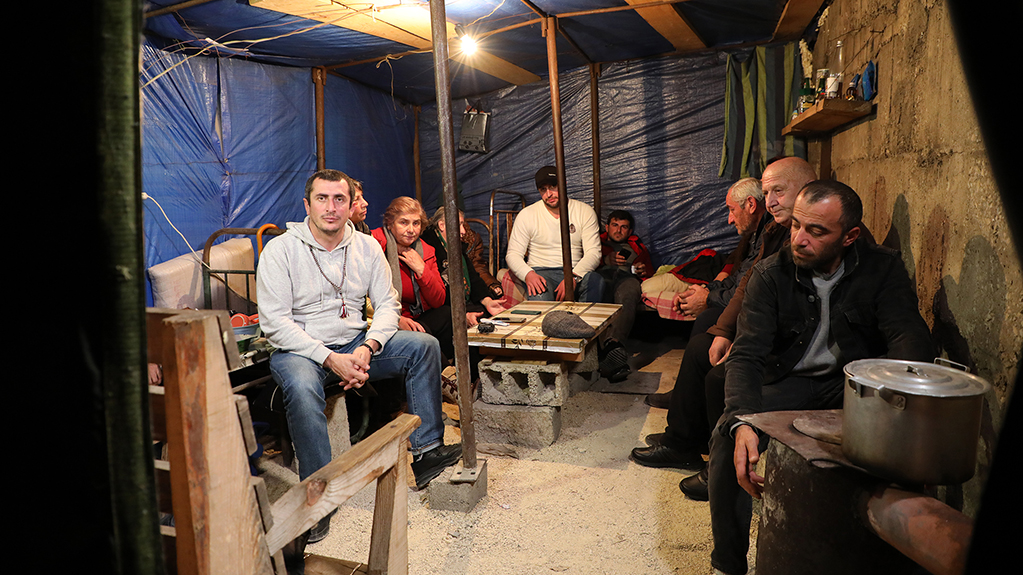Even on St. George's Day, Shukruti remains a hotbed of protest. Local residents have been picketing the entrance to the Korokhnali mine for 256 consecutive days. They are demanding fair compensation from Georgian Manganese so they can rebuild their lives in safe villages within the neighboring region - not in London, New York, or Paris, as the billionaire company's executives claim in an attempt to discredit the protesters.
News
“For us in Chiatura, manganese is not wealth - it is a curse. It benefits only a select few: individuals who come from other regions, work here as managers, and grow richer at the expense of our suffering,” says Giorgi Tsartsidze, who was fired from one of the companies owned by Georgian Manganese for participating in the protest. Along with him, six more employees were dismissed at various times. The underlying reason is the same in every case: they are also from Shukrut and took part in the protest during non-working hours.
Losing their jobs and being deprived of their livelihoods was not the only form of pressure used to suppress the Shukrut protest:
- Another five people were fired for their involvement in the demonstrations.
- At the request of Georgian Manganese, the prosecutor’s office brought criminal charges against three protesters, accusing them of organizing a group action, actively participating in it, and disrupting the enterprise’s operations. Georgian Manganese alleges the protests caused 5.5 million GEL in damages. These charges carry penalties ranging from a fine to up to three years in prison.
- the prosecutor’s office filed aggravated charges against protest organizer Giorgi Neparidze after he announced plans for a rally near the home of Bidzina Ivanishvili, the leader of the ruling Georgian Dream party.
- At Georgian Manganese’s request, the Sachkhere District Court prohibited Shukruti residents from protesting near the Korokhnali and Shukrut mines.
- Emergency personnel and police blocked Shukruti residents from conducting a peaceful march to Bidzina Ivanishvili’s residence in Chorvila, denying all protesters entry to the village.
On September 11, some Shukruti protesters relocated to Tbilisi, where they began demonstrating near the parliament. For a month, hunger strikers, including women and children, stayed outside the parliament day and night. However, the Ministry of Internal Affairs violated the constitution by refusing to let them set up tents.
- Meanwhile, at Georgian Manganese’s request, the Sachkhere court confiscated the homes and land of the protesters’ parents, family members, and close relatives.
“When the public defender came to parliament and addressed us, it became clear that he didn’t have complete information about our protest. We provided a large amount of evidence. It has been two months now, and there has been no response,” Giorgi Neparidze recounts.
The Shukruti residents stopped their hunger strike and protests outside the parliament a few days before the parliamentary elections, after Rati Ionatamishvili, chairman of the Parliamentary Human Rights and Civil Integration Committee, promised to facilitate negotiations with the company. Three meetings were held, but none yielded results.
According to Georgian Manganese, as of November 1, all mines in Chiatura and the Zestaponi ferroalloy factory - also owned by Georgian Manganese LLC - have suspended operations for four months, citing the long-standing protests in Shukruti. Mtis Ambebi investigated the situation within the company, whose management rights were transferred to a Ukrainian oligarch under Georgian Dream’s 2017 decision to appoint a court administrator.
Despite the suspension, Georgian Manganese continues mining ore through open-pit operations in Chiatura’s villages. “If we leave now, the work process will resume within an hour, and our eight-month struggle will have been in vain. If mining continues, the destruction will only accelerate, and the entire village will be razed to the ground - just like what happened in Itkhvisi. We are facing the exact same threat,” Neparidze explains, emphasizing that the protesters will not back down until the company, with state involvement, signs a written agreement guaranteeing fair compensation for the victims.















